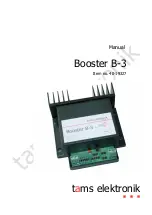
6
Hints for General Use
NOTE:
After extended blending, espe-
cially dry food, you may notice a black
film inside the top of the blender base.
This is a normal, FDA-approved, food-
grade lubricant used to ensure the
long-life of your cutting assembly.
• Processing hot foods or liquids in the
blender may cause hot liquid to spurt
out when the cover is removed.
Always remove the filler cap of the lid
before blending hot foods or liquids.
Keep hands and other exposed skin
away from the cover opening to
reduce risk of possible burns.
• To add foods when blender is
operating, remove filler cap from
container lid and add ingredients
through the opening.
• Do not store food or liquids in the
blender jar.
• For best performance, the minimum
amount of liquid needed per recipe is
one cup (8 ounces/250 ml). Add more
liquid if food is not blending properly
• If blending action stops during
blending or ingredients stick to sides
of the jar, there may not be enough
liquid in the jar to blend effectively.
• Do not try to mash potatoes, mix stiff
dough, whip egg whites, grind raw
meat, or extract juices from fruits and
vegetables. The blender is not made
to perform these tasks.
• If food being processed (solid food or
ultra-thick beverages) will not dis-
pense always pour from jar.
• Avoid bumping or dropping the
blender.
Control Panels
Your blender may have 8 to 12 speeds.
They all operate similarly. For blenders
with 10 or more speeds, first select and
push a LO or HI power button then push
desired speed button. When using
PULSE or IceBreaker the blender will
operate only as long as button is
pushed. The remaining speed buttons
will run the blender until OFF is pushed.
NOTES:
•
Speed increases as the buttons are
pushed top to bottom.
• The dispenser button also serves as
the highest speed at which the blender
will operate. It is important to turn the
blender on by pressing the dispense
button when dispensing the contents
of the jar.
840143800 ENv03.qxd 1/6/06 9:05 AM Page 6







































